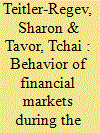|
|
|
Sort Order |
|
|
|
Items / Page
|
|
|
|
|
|
|
| Srl | Item |
| 1 |
ID:
180047


|
|
|
|
|
| Summary/Abstract |
COVID-19 pandemic created a health emergency that led to a huge global economic crisis. This article examines the effects of a wide range of variables including the number of infections, deaths, and recoveries, as well as categorical variables like public behaviour and government restrictions on stock indexes on 16 different countries. It compares the situation in Israel with the other explored countries. The regression analysis revealed that while in Israel all the variables affected stock-index returns, in the other countries only a few of the variables did so.
|
|
|
|
|
|
|
|
|
|
|
|
|
|
|
|
| 2 |
ID:
174575


|
|
|
|
|
| Summary/Abstract |
This article examines the evolution of stock market analysts’ recommendations in Israel in 2002–17. Over these years, Israel has been marked by far-reaching changes in its economy. Its capital market has grown, developed, and embarked on a process of regulation. To track the quality of analysts’ recommendations, nine indices from stock exchanges that were found leaders in their recommendation were selected to represent the spectrum of investment opportunities. Calculating the deviation of two investment portfolios, analysts’ recommendations and equal division, from the efficient portfolio frontier leads to the conclusion that until 2007 the portfolio of analyst’s recommendation has no added value compared to equal division and only afterwards a significant gap has been opened.
|
|
|
|
|
|
|
|
|
|
|
|
|
|
|
|
| 3 |
ID:
151688


|
|
|
|
|
| Summary/Abstract |
In recent years, terrorist organizations have made considerable progress in their operations and in the technology they employ by using unguided rockets. Such developments are amplified in the case of Israel, where they pose a clear and present danger to the country’s population centers. This article examines how the firing of unguided rockets at Israel impacts the capital market and whether such impact is permanent or transitory. Having examined firing events based on categorical characteristics of the Terror Index, the article detects a negative correlation between the severity of the event, the range of the trajectories, the number of fatalities and wounded, and index returns. Similarly, it was observed that only in the events accompanied by low rocket-firing rates were the capital markets permanently affected.
|
|
|
|
|
|
|
|
|
|
|
|
|
|
|
|
| 4 |
ID:
122071


|
|
|
|
|
| Publication |
2013.
|
| Summary/Abstract |
The phenomenon of mergers and acquisitions is an ancient one, yet it has gained considerable momentum in recent years. It has also taken root in Israel as local companies utilize mergers as a strategic means for promoting growth and efficiency. The information granted to investors undergoes three main events: rumour of the merger, the declaration of the merger, and its execution. In this article, the merger phenomena in the Israeli market are examined from a different angle. This research attempts to characterize each event using two approaches: in the first, the differences in abnormal returns between the different stages are examined, for both acquiring and target firms. In the second assessment, the dependence of abnormal returns on the number of days between declaration and execution is examined, for both types of firms. The results of the first approach revealed that acquiring companies face negative abnormal returns, while target companies face positive abnormal returns during the days of the events. The second approach exposed a certain investor predilection for different time ranges - i.e. investors favour mergers that are executed in the medium and long term, as opposed to short-term mergers.
|
|
|
|
|
|
|
|
|
|
|
|
|
|
|
|
| 5 |
ID:
167162


|
|
|
|
|
| Summary/Abstract |
Most Israelis live in big and small cities and two neighborhood types that are unique to Israel – the moshav and the kibbutz – thus offering a natural experimental field for exploring the relationship between place of residence and general and financial risk aversion. Based on a sample of 528 questionnaires, this study found that independent of one’s place of residence respondents proved more risk averse in their general decision-making than with regard to financial issues. The kibbutz respondents demonstrated the highest average level of risk aversion, followed by small-city dwellers, big-city residents, and moshav members. The kibbutz level of risk aversion is inconsistent with the Cushion Hypothesis, while the lowest level of risk aversion demonstrated by moshav residents suggests that facing an independent lifestyle and significant dilemmas on a daily basis reduces not only the individual’s level of risk aversion in general, but also the level of intimidation associated with financial issues.
|
|
|
|
|
|
|
|
|
|
|
|
|
|
|
|
|
|
|
|
|